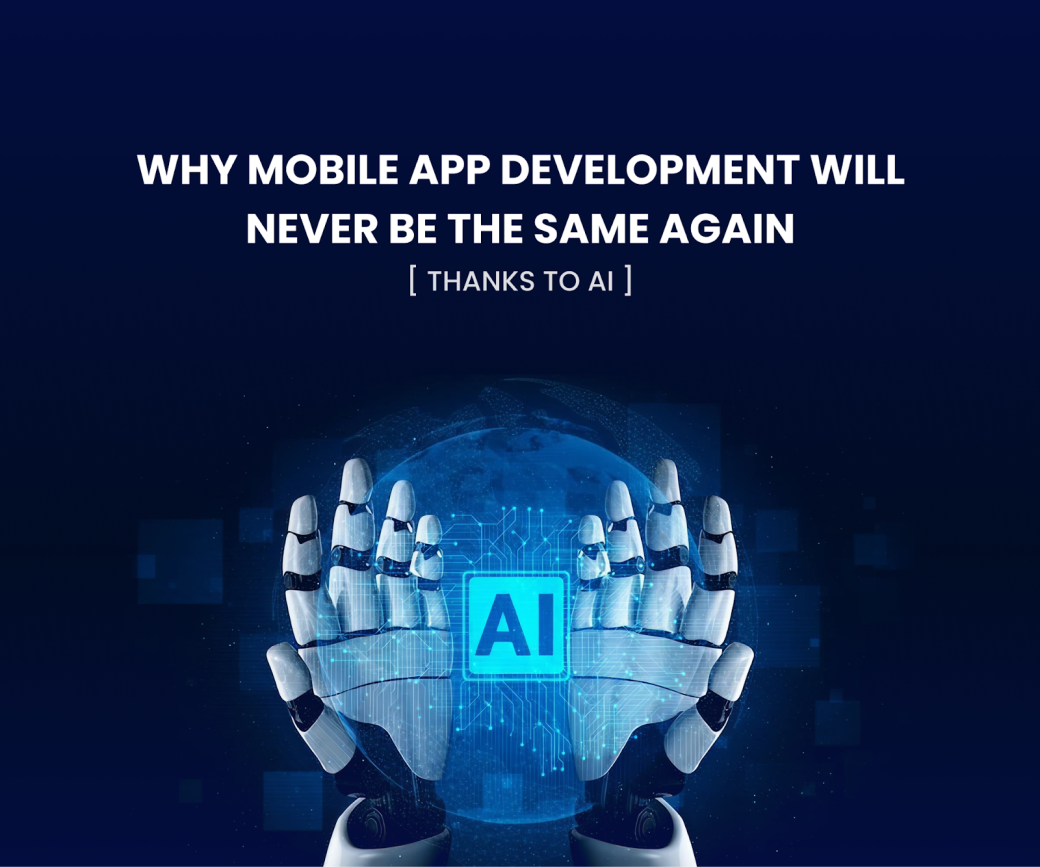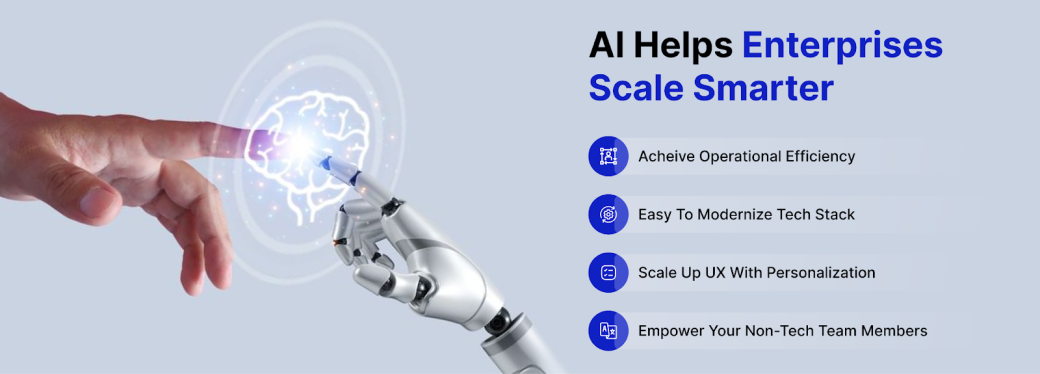Why Mobile App Development Will Never Be the Same Again (Thanks to AI)

Why Mobile App Development Will Never Be the Same Again (Thanks to AI)
Whether you're a startup founder, an enterprise team, or an agency building for others, AI is changing how mobile apps get built. This blog unpacks what that shift looks like: faster timelines, leaner teams, smarter products, and why embracing this AI-powered approach isn't optional anymore - it's the new standard.

The AI Shift Is Here
Let’s face it - mobile app development hasn’t changed much in years. The platforms evolved, languages matured, and design trends came and went. But the process? Still largely the same: ideate, wireframe, code, test, deploy.
That was until AI showed up.
Today, building a mobile app no longer means months of planning, sprints, and caffeine-fueled code pushes. With AI, teams are accelerating from idea to prototype - and from prototype to product - at a pace that was unthinkable just a couple of years ago.
AI isn’t just a productivity boost. It’s a reimagination of the entire development pipeline. From ideation and design to code generation, testing, optimization, and even in-app intelligence, every piece of the puzzle is being redefined.
From “Traditional” to “AI-First” Development
Let’s paint a quick before-and-after.
Old way:
- Whiteboarding features and manual wireframing
- Writing every line of code from scratch and using Stack Overflow for help
- Spending weeks (or months) on QA cycles with a team of human testers
- Burning dev hours on repetitive logic and making human mistakes
AI-powered way:
- Type a prompt, get a UI mockup
- Let AI generate your component code and boilerplate logic
- Automate test coverage as you build
- Launch with built-in assistants and smart UX features
In short, AI has reduced time-to-build and increased room-to-innovate.
AI Tools That Are Rewriting the App Development Stack
AI for Ideation and Wireframing
Building starts with a blank screen — or used to.
Now, tools like Galileo AI allow you to describe a screen in plain English (“a finance dashboard with spending categories and a line graph”), generating clean, responsive UI mockups in seconds.
Pair that with UX Pilot AI, a Figma plugin that generates wireframes and UI layouts directly inside your design workspace — and suddenly, product managers, designers, and even non-technical founders can bring ideas to life visually with just a few prompts.
AI-Assisted Code Generation — Does More Than Just Autocomplete
A couple of years back, even tools that assisted in writing the next lines of code seemed like a major breakthrough. Compared to the latest advent of new tools, that sounds like ages ago. Today’s AI-powered IDEs and assistants fundamentally change how developers write, refactor, and maintain code.
Let’s break down what’s possible now:
- Boilerplate generation: Writing the same authentication flows or data-fetching hooks for the 18th time? AI tools like GitHub Copilot, Cursor, and Windsurf generate reusable blocks instantly. This saves hours per project and standardizes code quality.
- Context-aware coding: Thanks to larger context windows with ever-evolving LLM models, tools like Cursor and Windsurf can understand entire files or even repositories. These tools are armed with the ability to memorize, replicate the patterns throughout the code, and debug like a pro.
- Code documentation: Instead of manually writing comments or README files, AI can now auto-document your functions, classes, and modules. Cursor even offers real-time doc generation, just like you code. Writing documentation has become the least of worries for a developer now.
- Refactoring made easy: Need to split a function into smaller, reusable components? Planning to migrate from one state management system to another? AI can assist with structural changes in your code, as long as they fit within the context window. This reduces technical debt while improving overall maintainability.
- Error handling & debugging: Get instant help when you hit a bug. The AI code tools can suggest fixes based on stack traces and log output and even point out logic flaws. This is a game-changer for junior developers — and a time-saver for seniors.
- Multi-language support: Many tools support Dart, JavaScript, TypeScript, Python, and more. Whether you're building in Flutter, React Native, or backend frameworks, AI adapts.

As someone deeply invested in AI-powered app development, I’ve seen firsthand how much of a shift this represents. At Flutternest, my team and I have rapidly adapted to this evolution, increasing engineer productivity by over 60% and delivering high-quality solutions to more clients than ever before. It’s no longer about writing every line of code — it’s about empowering teams to build smarter, faster, and more reliably.
Think of it as having a 10x engineer silently working alongside you — reviewing, writing, and optimizing every step of the way.
Automated Testing & QA
Buggy apps kill user retention. But manual QA slows down releases. Enter AI testing tools.
- Mabl automatically adapts test cases when your UI or logic changes, reducing false positives and regression bugs.
- Testim creates intelligent test flows using natural language and visual testing.
- Cursor also shines here, letting you generate unit and integration tests directly inside the codebase.
With AI, QA becomes a continuous companion in your development loop, not a bottleneck that waits until the end.
Conversational AI as a Feature
AI isn’t just changing how we build apps — it’s also transforming what apps can do.
Thanks to large language models (LLMs), it’s now easier than ever to embed conversational experiences right into your mobile app.
- OpenAI’s GPT-4, Anthropic’s Claude, and Google’s Gemini are being used to create in-app assistants, smart onboarding flows, customer support bots, and even productivity co-pilots.
- For startups, this means you can deliver “enterprise-level” AI experiences with minimal integration.
- For users, it means better support, faster answers, and a more personalized app journey.
What This Means for Startups — Build Fast, Learn Faster

AI has changed the game for mobile app startups. Getting an idea off the ground is no longer a long, expensive process.
- Build faster than ever: What once took months of back-and-forth between designers, developers, and testers can now be done in just a few weeks. With AI helping out with UI design, writing repetitive code, and even running basic tests, early-stage founders can turn an idea into a working prototype before the coffee goes cold.
- Small teams, big results: You no longer need a huge engineering squad. A small, scrappy team of two or three devs using the right AI tools can build what used to take twice the manpower. That means less money was burned, and there was more room to breathe in those early days.
- Quick feedback, rapid updates: Got user feedback? No need to wait for the next sprint. AI lets you make small changes to the UI, test a new flow, or tweak the backend — sometimes in a matter of hours. The loop from feedback to improvement just got a whole lot tighter.
- Spend where it counts: Instead of pouring most of your seed money into a large dev team, you can focus more on growth — getting users, forming partnerships, and building your brand. AI cuts down on dev costs, freeing up the budget for what matters early on.
“In a startup, speed is your moat. AI gives you the power to ship, learn, and scale faster than incumbents.”
What This Means for Enterprises — Scale Without the Sprawl

For large organizations, AI brings efficiency, scalability, and smarter product development:
- Operational efficiency: Automate redundant tasks like writing UI components, fixing minor bugs, or generating API integrations. This frees senior devs to focus on architecture and innovation, not grunt work.
- Cross-team enablement: With AI tools, non-technical stakeholders (PMs, marketers, CX teams) can prototype flows or edit interface copy without waiting on devs. This shortens handoff cycles and empowers teams.
- Personalized UX at scale: AI can power real-time behavioral personalization - tweaking content, recommendations, or onboarding flows per user. That’s difficult to do manually at scale, but easy with embedded AI.
- Modernizing the stack: Legacy systems slow innovation. With AI, enterprises can refactor legacy codebases faster or build internal tools with smaller teams. Tools like Windsurf and Copilot Enterprise even offer secure, team-based AI assistance inside private repos.
“Enterprise tech debt isn’t just a code problem — it’s a speed problem. AI helps you break free.”
From Developer to AI-Pilot, The Role Is Evolving
We’re witnessing a shift in what it means to be a mobile app developer. It’s less about writing code, and more about designing intelligent systems, guiding AI, and making architectural decisions.
Today’s developers:
- Write prompts as much as code: Knowing how to instruct Copilot or Cursor to generate the right logic is becoming a core skill.
- Review, refine, and orchestrate: AI provides suggestions - devs decide how to assemble them into working, scalable systems.
- Work faster with fewer context switches: Tools like Cursor let you search, edit, test, and document from one AI-enhanced editor.
- Think in systems: You’re no longer just coding screens; you’re designing how AI, UI, data, and APIs interact.
Would you invest your time working with an agency still stuck in legacy tools and outdated practices — one that hasn’t embraced the power of AI in modern development? Today, working with an AI-adaptive team is no longer optional. Mobile app developers must now think like system architects — capable of designing scalable, efficient solutions that evolve with your product's needs.
Just recently, we helped a client migrate their aging app stack to Flutter, a cross-platform framework we specialize in. By combining our technical depth with the AI tools mentioned in this blog, we helped them unlock a wave of hyper-growth — faster release cycles, fewer bugs, and a much better user experience.
“Developers are becoming strategists. AI handles the syntax — you handle the symphony.”
But Let’s Be Real — Challenges Still Remain
AI tools are powerful — but they’re not flawless. Here’s where caution is still needed:
- Hallucinations: LLMs sometimes generate logic that looks correct but is functionally wrong. For example, an AI might generate a Flutter widget using deprecated APIs or fabricate functions that don’t exist.
- Security risks: AI-generated code can introduce vulnerabilities, like SQL injection or unsafe state management, especially if not reviewed properly. Devs must treat AI suggestions as drafts, not gospel.
- Model drift and reliability: Tools might work well one day and then behave differently after an update. Enterprises need consistent behavior, which open-ended AI doesn't always guarantee.
- Lack of accountability: Who owns the bug if it came from an AI suggestion? Is the AI liable? (Short answer: no.) Developers must maintain responsibility.
- Data privacy & compliance: Using AI APIs often means sending user data to external servers. If you’re working in fintech, health, or enterprise — this could raise GDPR or HIPAA concerns.
“AI is a powerful tool — but like any tool, it’s only as good as the person wielding it.”
Final Thoughts: The Future Is Already Here

Whether you’re building your next big idea, optimizing an enterprise workflow, or simply trying to reduce technical debt, one thing’s clear: AI is the new foundation layer of the mobile development stack.
Startups will move faster. Enterprises will scale smarter. Developers will evolve into AI-native creators.
Welcome to the new normal. Mobile app development will never be the same again.
